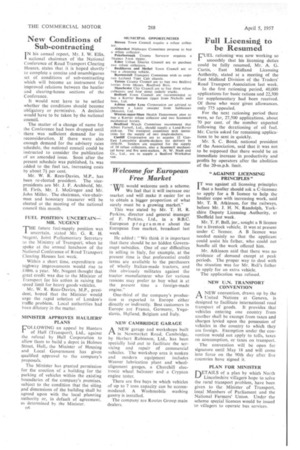Full Licensing to be Resumed
Page 46

If you've noticed an error in this article please click here to report it so we can fix it.
F UEL rationing was now working so I smoothly that his licensing duties could be fully resumed, Mr. A. G.
Curtis, • East Midland Licensing Authority, stated at a meeting of the East Midland Division of the Traders' Road Transport Association last week.
In the first rationing period, 40,000 applications for basic rations and 22,500 for supplementary had been received. Of those who were given allowances. only 775 appealed.
For the next rationing period there were, so far, 27,500 applications, about 70 per cent. of the number expected following the derationing of oil fuel. Mr. Curtis asked for remaining applications to be sent in quickly.
Mr. S. C. Bond, national president of the Association, said that it was not to be supposed that there would be an immediate increase in productivity and profits by operators after the abolition of the 20-m.p.h. limit.
"AGAINST LICENSING PRINCIPLES"
I T was against all licensing principles that a haulier should ask a C-licensee to apply for a B licence to help the haulier cope with increasing work, said Mr. T. B. Atkinson, for the railways, before Mr. I. H. N. Randolph, Yorkshire Deputy Licensing Authority, at Sheffield last week.
Mr. T. F. Ball, jr., sought a B licence for a livestock vehicle. It was at present under C licence. A B licence was needed mainly so that the applicant could assist his father, who could not handle all the work offered him.
Mr. Atkinson said that there was no evidence of demand except at peak periods. The proper way to deal with the situation was for Mr. Ball's father to apply for an extra vehicle.
The application was refused.
NEW U.N. TRANSPORT CONVENTION
ANEW convention, drawn up by the United Nations at Geneva, is designed to facilitate international road transport of goods. It provides that vehicles entering one country from another shall be exempt from taxes and charges levied upon the possession of vehicles in the country to which they are foreign. Exemption under the convention would not apply to toils, taxes on consumption, or taxes on transport.
The convention will be open for signature until May 18 and will come into force on the 90th day after five countries have signed it.
PLAN FOR MIN ISTER
DETAILS of a plan by which North Lincolnshire villagers hope to solve the rural transport problem, have been given to the Minister of Transport, local Members of Parliament and the National Farmers' Union. Under the scheme special licences would be issued to villagers to operate bus services.
















































































































